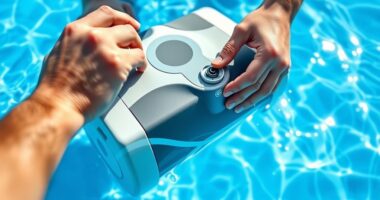Automatic pool cleaners generally last between 1 to 5 years, depending on the type, quality, and how well you maintain them. Robotic models tend to last the longest, around 3 to 5 years, while pressure and suction-side cleaners may need replacement sooner. Proper care—like cleaning filters, inspecting parts, and storing them properly—can extend their lifespan. If you want tips to maximize their durability and know when to replace, keep going for more insights.
Key Takeaways
- Robotic pool cleaners typically last 3 to 5 years with proper maintenance.
- Pressure-side cleaners usually last 2 to 4 years, depending on usage and care.
- Suction-side cleaners often have a lifespan of 1 to 3 years due to increased wear.
- Regular cleaning, inspections, and proper storage can extend the lifespan of any automatic cleaner.
- Signs like decreased cleaning performance or motor issues indicate it’s time for replacement.
Factors That Impact the Lifespan of Automatic Pool Cleaners

Several factors influence how long your automatic pool cleaner will last. One key aspect is pool chemistry. Maintaining proper pH levels and chemical balance prevents corrosion and damage to your cleaner’s parts, extending its lifespan. Poor chemistry can cause buildup or wear, forcing you to replace components sooner. Energy efficiency also plays a role; a cleaner that uses power wisely experiences less strain on its motor, reducing wear and tear. Regularly cleaning filters and inspecting parts help ensure it runs smoothly and efficiently. Additionally, avoiding overuse and following manufacturer guidelines can prevent unnecessary stress on the device. Proper maintenance practices, including cleaning and inspecting, can significantly extend the life of your cleaner. Ensuring that your pool’s filtration system is properly maintained can also contribute to the longevity of your automatic pool cleaner. Using appropriate cleaning techniques can help prevent damage and keep the device operating at peak performance. Maintaining proper pool chemistry levels and keeping your equipment in good condition can also reduce the likelihood of unexpected breakdowns. By keeping your pool chemistry balanced and ensuring your cleaner operates efficiently, you help maximize its durability and get the most value from your investment.
Typical Lifespan Expectations for Different Types of Cleaners

The lifespan of your automatic pool cleaner varies depending on the type you choose. Robotic cleaners typically last around 3 to 5 years, thanks to their sturdy design and advanced device durability. They’re efficient for pool cleaning and often require less maintenance, which helps extend their lifespan. Pressure-side cleaners, on the other hand, usually last about 2 to 4 years. They rely on your pool’s pump, so their durability depends on your system’s performance. Suction-side cleaners tend to have a shorter lifespan, averaging 1 to 3 years, because they experience more wear and tear from frequent use. Overall, your choice impacts how long your device remains effective for pool cleaning, so selecting a high-quality model can maximize its longevity. Proper maintenance and regular inspections can also significantly contribute to extending the life of your automatic pool cleaner. Additionally, using recommended replacement parts ensures optimal function and durability over time, and understanding the specific design features of each cleaner type can help you choose the best option for your needs. Recognizing the impact of environment on your cleaner’s components can further help in maintaining its performance over the years, especially considering how robotic cleaners are designed to withstand various conditions.
Signs Your Pool Cleaner May Need Replacing

If your pool cleaner isn’t performing as well as it used to, it might be time to contemplate replacing it. Watch for signs like decreasing cleaning efficiency, especially if larger debris or debris buildup around the pool isn’t being cleared effectively. Your cleaner may struggle with your pool size, taking longer or missing spots entirely. Consider replacing it if you notice:
If your pool cleaner’s performance declines, it may be time for a replacement to keep your pool pristine.
- Persistent debris in the pool despite regular cleaning
- The cleaner getting stuck or losing suction
- Reduced movement or coverage over time
- Frequent breakdowns or motor issues
These signs suggest the cleaner’s parts are worn out or no longer functioning properly. If your cleaner can’t handle your pool size or debris buildup, it’s likely time for an upgrade to maintain a clean, safe swimming environment.
How Proper Maintenance Extends Your Pool Cleaner’s Life

Maintaining your pool cleaner properly can substantially extend its lifespan and keep it performing at its best. Establishing regular cleaning schedules ensures debris doesn’t clog filters or damage internal parts. Clean the brushes, filters, and sensors weekly to prevent buildup that can hinder performance. When storing your cleaner, follow storage tips such as rinsing it thoroughly and storing it in a cool, dry place away from direct sunlight. Proper storage prevents premature wear and protects delicate components. Avoid leaving your cleaner exposed to harsh weather or chemicals, which can cause deterioration. Consistent maintenance, including timely cleaning and correct storage, minimizes wear and tear, saving you money and effort in the long run. Staying proactive with upkeep is the key to maximizing your pool cleaner’s lifespan. Additionally, understanding how automatic pool cleaners last can help you plan for repairs or replacements before significant issues arise. Regularly inspecting your cleaner for signs of wear and tear ensures early detection of potential problems, further extending its longevity. For optimal performance, consider periodically checking the internal components for any damage or corrosion.
Common Wear and Tear Causes in Automatic Pool Cleaners

As your pool cleaner gets used, parts can wear out or break down. Mechanical components may weaken over time, and the power cord or motor can suffer damage with frequent use. Understanding these common issues helps you keep your cleaner running smoothly longer. Additionally, choosing a model with durable preppy dog names can sometimes be a fun way to personalize your equipment.
Mechanical Wear Over Time
Over time, mechanical components of automatic pool cleaners are susceptible to wear and tear from constant use and exposure to pool chemicals. This can lead to issues like brush wear, reducing cleaning efficiency, or gear failure, which hampers movement. Regular use accelerates these problems, especially if maintenance is neglected. Additionally, some models may contain beneficial ingredients that can degrade with prolonged exposure, further influencing the longevity of the device. Proper maintenance, such as cleaning brushes and inspecting gears, along with understanding lifecycle expectations of parts, extends the life of your cleaner and reduces early mechanical failure. Signs of mechanical wear include: – Frayed or worn brushes needing replacement – Gear failure causing the cleaner to stall – Jamming due to debris buildup – Corrosion on metal parts from chemical exposure. Conducting routine inspections and replacing worn parts promptly can significantly improve the performance longevity of your automatic pool cleaner. Keeping an eye on these signs helps prevent breakdowns.
Power Cord and Motor Damage
Power cords and motors are critical components of automatic pool cleaners, and they often endure the most wear and tear during regular use. Over time, exposure to water, sunlight, and constant movement can cause cord damage, making the power cord brittle or frayed, which increases the risk of electrical issues. Regularly inspecting the cord for cracks or exposed wires and listening for motor irregularities can help you catch problems early. Addressing cord damage promptly and maintaining the motor can extend your cleaner’s lifespan and keep it running smoothly. Additionally, understanding the wear and tear common to these components can help you plan for timely repairs or replacements. Proper maintenance practices, such as cleaning the motor and avoiding tangling of the cord, can further reduce premature failure and prolong the lifespan of your pool cleaner. Regular inspection routines can help detect early signs of deterioration before they lead to complete failure. Keep in mind that environmental factors like sunlight exposure can accelerate deterioration, so storing the cleaner properly when not in use is also important.
Tips for Maximizing the Durability of Your Pool Cleaner

To extend the lifespan of your automatic pool cleaner, it’s essential to perform regular maintenance and handle it with care. Keep the pool’s chemical balance ideal to prevent corrosion and buildup that can damage internal parts. Consider pool accessory upgrades, like better brushes or filters, to improve efficiency and reduce strain on your device. Additionally, clean the cleaner regularly, especially the brushes and intakes, to prevent clogs. Store your cleaner in a dry, shaded area when not in use to avoid unnecessary wear. Proper appliance maintenance plans can also help keep your pool cleaner in top condition over time. Staying informed about creativity in the digital age can inspire new ideas for how to care for your equipment and enhance your pool experience. Regularly inspecting your device for signs of wear and tear, and replacing parts when needed, can prevent bigger issues later. Understanding the emotional support aspects related to routine maintenance can make the process more manageable and less stressful. Incorporating vegetable juices into your routine may also promote overall wellbeing, which can positively impact your attitude towards maintenance. Being aware of common pool cleaning issues can help you troubleshoot problems before they become costly repairs.
When to Repair Versus Replace Your Pool Cleaning Device

Knowing when to repair or replace your pool cleaner can save you time and money. If your cleaner is frequently malfunctioning, it might be more cost-effective to replace it, especially if repairs don’t address underlying issues. Poor pool chemistry, such as imbalanced pH or high calcium levels, can cause wear and tear, leading to recurring problems. Consider your user preferences too; if you value convenience and reliability, replacing an old, unreliable cleaner may be the best choice. However, if repairs are minor and the device still performs well after maintenance, fixing it makes sense. Always evaluate the overall condition, repair costs, and how well the cleaner meets your needs to decide whether to repair or replace. Additionally, understanding latest breakthroughs in machine learning tech can help manufacturers develop more durable and efficient pool cleaning devices in the future.
Cost Considerations: Investing in Longevity and Performance

Investing in a high-quality automatic pool cleaner can save you money in the long run by providing reliable performance and reducing the need for frequent repairs. When considering cost, look beyond the initial price tag—think about durability, efficiency, and brand reputation. A reputable brand often offers better materials and technology, leading to fewer breakdowns and longer lifespan. To maximize cost savings, choose a model designed for longevity and easy maintenance.
- Better build quality reduces repair costs
- Reliable performance minimizes downtime
- Trusted brands ensure quality assurance
- Upfront investment pays off over time
Focusing on these factors helps you avoid frequent replacements, ensuring your cleaner performs well season after season and ultimately saving you money.
Frequently Asked Questions
Can Automatic Pool Cleaners Be Used in Saltwater Pools?
Yes, you can use automatic pool cleaners in saltwater pools. Many modern models are designed for automatic maintenance and work well with saltwater systems. Just guarantee your pool cleaner features compatible pool cleaning technology to prevent corrosion. Regularly check and maintain your cleaner to maximize its lifespan. Using the right equipment helps keep your saltwater pool clean and functioning efficiently without damaging your automatic pool cleaner.
Are Robotic Pool Cleaners Safe for All Pool Surfaces?
Think of robotic pool cleaners as skilled dancers, gracefully moving across your pool’s surface. They’re generally safe for most pool surface compatibility, but it’s crucial to check manufacturer guidelines. When used correctly, they offer excellent cleaning effectiveness without damaging delicate surfaces. Be mindful of the type of pool surface you have, and choose a cleaner specifically designed for it to guarantee smooth operation and a spotless pool every time.
How Does Climate Affect the Longevity of Pool Cleaners?
Climate impact and weather effects considerably influence your pool cleaner’s lifespan. Harsh climates, extreme temperatures, and frequent storms can cause wear and tear, reducing durability. If you live in a region with heavy rainfall or intense sun, your cleaner may need more maintenance or replacement sooner. To extend its life, regularly clean, store it properly during off-seasons, and protect it from extreme weather conditions.
Do Pool Cleaners Require Professional Servicing Regularly?
Ever wondered if your pool cleaner needs professional servicing? Regular maintenance routines keep your device running smoothly, preventing costly repairs down the line. You might ask, “Is it really necessary?” The truth is, routine check-ups help spot issues early, reducing repair costs and extending its lifespan. So yes, scheduling professional servicing periodically guarantees your cleaner performs at its best, saving you time and money in the long run.
Can I Upgrade Parts of My Pool Cleaner to Extend Its Lifespan?
You can definitely upgrade parts of your pool cleaner to extend its lifespan. Regular maintenance tips include inspecting and replacing worn parts like brushes, wheels, or filters. Part replacement is a smart way to keep your cleaner functioning efficiently without buying a new one. By staying on top of maintenance and swapping out necessary parts, you guarantee your automatic pool cleaner stays in good shape for years to come.
Conclusion
On average, automatic pool cleaners last about 5 to 8 years with proper care. Regular maintenance can extend their lifespan, saving you money and hassle. Did you know that neglecting routine upkeep can cut a cleaner’s life by nearly half? By staying on top of repairs and cleaning, you’ll get the most out of your investment, ensuring your pool stays pristine without frequent replacements. Proper care truly makes all the difference.









